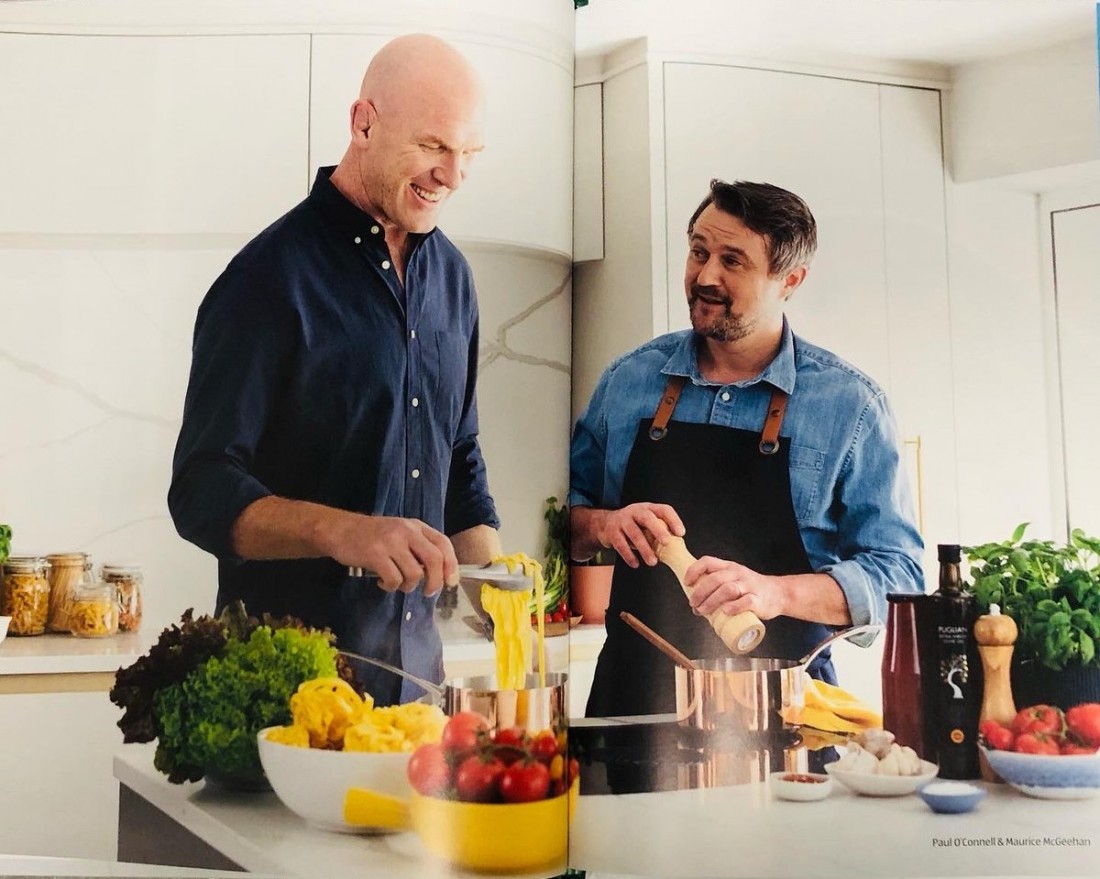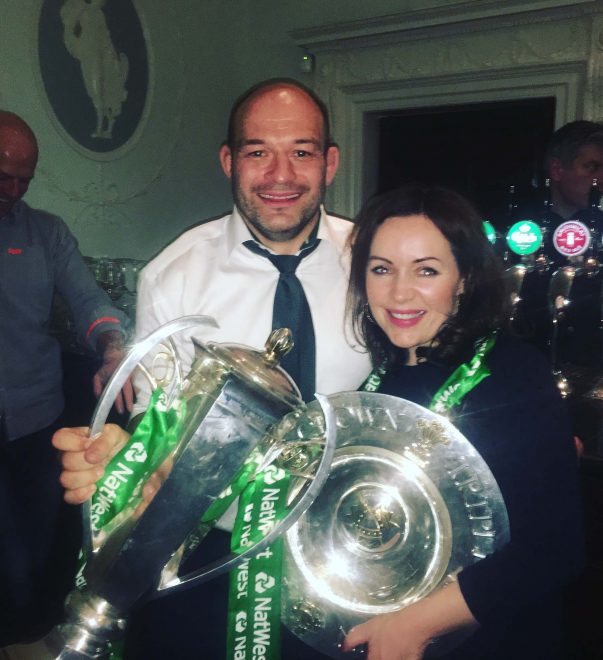‘You are what you eat’
We meet the Donegal man directly responsible for fuelling the Irish rugby team
By Frank Craig
Fintown native Maurice McGeehan is the Performance Chef for the IRFU – a role where he combines his culinary experience with his understanding of the science of nutrition.
The Naomh Conaill clubman is tasked with delivering high quality, nutritious meals to all players and staff at the IRFU High Performance Centre. He also manages the day-to-day operational requirements of the kitchen at their base in Abbotstown.
Maurice and his team produce quality food, for multiple services each day, for the national high-performance teams of Ireland’s squads, including the men’s and women’s seniors, the Under 20s and men’s and women’s sevens.
Having previously worked as the corporate executive chef for Airbnb headquarters in Dublin for five years, setting up a healthy and sustainable food program for the company, in 2020, he took on this new and exciting role with the IRFU.
Here, he explains to the Donegal News’ Frank Craig just what that entails…
FC: There is a real responsibility to what you do – this is much more than simply cooking. This is fuelling and refuelling professional athletes…
MMG: Yeah, we’ve just got over the Autumn International Series. The last week of that was exceptionally busy, as we had all our teams in camp for the first time since before lock down. You’re looking at up to 300 meals per day. The Under 20 portions are significantly larger than the other teams as they’re classed as “gainers”, the stage where they are looking to increase muscle and weight. The food consumption is broken down into three categories, the gainers that I just mentioned, you have the maintainers, players who are looking to maintain their weight, and then losers, which will get smaller portions so to reduce their weight. The performance nutritionist works closely with the players to advise them on portion sizes to help them understand how much or how little they should be eating, and all players take responsibility for what they add to their plates.
The seniors would mostly fall into the category of maintaining. But the Under 20s, and most people find this surprising, are the bigger eaters. There is a very important educational side to what we do, especially with the young, under-age players coming through, in regards to food and nutrition. There is a culture of supplements for that age group as they come in, and although there will always be a need for supplements, we educate the players that they can get what they need from fresh, home made, nutritionally dense meals, instead of relying too much on additional supplements. Most protein shakes for example, if you are looking at them for an intake of casein or whey, that’s all you will get from them. If you get a balanced and nutritious meal, you will get as much protein as you need, with additional macro and micro nutrients, such as vitamins, minerals and electrolytes. We offer exciting, healthy, world streetfood-style post-training, nutritional dense snacks for recovery.
This creates more engagement with the food and introduces the players to new ingredients and different styles of food. I also do a lot of fermented foods and drinks to help promote gut health and help aid immune systems, such as kimchi, sauerkrauts, yogurts, kefirs and kombuchas. Everyone is enthusiastic about trying something new and nutritious. We always have foods that are high in nitrates like rhubarb, beetroot and green leafy vegetables such as rocket, spinach and lettuce on our salad and juice bars. Nitrates relax the blood vessels, allowing an increase of oxygenated blood to reach muscles, which helps improve performance and recovery as well. And as you need to have a consistent daily intake of nitrates for this to work, our food options are always varied and creative.
FC: Rugby, we’re looking at all kinds of shapes and sizes. Their nutritional needs, how is all of that calculated or decided?
MCG: My core responsibility is to provide meals for the various teams that aid recovery while the players are in camp. This can range from breakfast, lunch, dinner, pre- and post-training snacks, in line with the varied nutritional requirements for each team. I work closely with the nutritionist for each team. All the food goes through an app called Nutritics, which analyses the composition of each dish, to make sure they are aligned with what is required for each squad. For example, the seniors would eat an all-round well-balanced meal, kefir smoothie, soups, breads, salads, different starches, red and white meats, fish and vegetables. The Sevens are more carbohydrate-focused and refuelling is the priority because of the high-intensity running that is required for their training and games. They would have smaller portions than the seniors and tend to go for soups and salads after the main meal. I don’t plate up for the players, they take full ownership and responsibility for all of that. They take things very seriously… they’re professionals and really tuned in to what they need to eat and how they fuel themselves.
There are three basic areas to aid recovery: rehydrate, repair and refuel. To rehydrate, we might offer something like a kefir smoothie or fresh juice; repair would be the protein intake and refuel would be the carbohydrate components of the dish. All the food and drinks are produced to a high level, restaurant standard. This provides the players with not only a balanced and nutritious intake, but also offers a meal experience. The recovery and refuelling side to things, it’s extremely important. But there is also a huge psychological aspect to it as well. I realised how important that really is when CJ Stander came up to say goodbye and thank us for everything. We talked for a bit and he told me that, in the year and a half that we’d worked together, he trained better than ever. And he said that was down to the food. He said that he was going out to train in a much better state of mind knowing he was going to get good food. The players love their food, and they are interested and inquisitive about it, which is great. They say one of the things they enjoy most about coming into camp is that after a seriously intense training session, they can sit down and switch off and enjoy a restaurant standard, nutritionally balanced meal, made from scratch to meet their needs. They joke, laugh, and have the craic. Good food creates good mood – that’s my motto. We recently put together a steak sandwich as a post-training snack, in the evening, before they go back to Carton House.
It was such a hit that I made a little deal with the players that it will stay on the menus as long as they keep winning! We try our best to make that experience as enjoyable as possible, with different menus and things that they’ll really enjoy. They are interested in fermentation and the jars of kimchi and sauerkraut we have on the shelves. We tell them how the benefits of gut health leads to a better immune system, so they get sick less and can train more. Last year was a long camp. They were in from early October until the end of November, with the end of the Six Nations and the Autumn Internationals, for a total of nine weeks. They were away from their families, in their bubbles, so we made sure they enjoyed their food, to takes the sting out of that and I feel it also helps with morale.
FC: The Six Nations is just around the corner. What challenges will that bring?
MMG: I’m working on our winter menus for the Six Nations right now. It’ll be a four-week menu, rotated as they come in. So, if they are in eight weeks, they’ll get two rotations of that. That will all go through Nutritics, and 99.9% of the time it’s fine. But on the odd occasion something might come back with a high oil or fat content in a certain dish. I just adjust or swap an ingredient with yoghurt or milk. As far as I’m aware I’m the only performance chef in the country at this moment, and the impact is measurable. The facilities at the IRFU High Performance Centre in Abbotstown here are world class. It’s an unbelievable feeling to be part of something like this, not many people have the chance to experience it. Andy Farrell and the coaching staff have a great team mentality, where we all feel part of what’s trying to be achieved. We live those highs and lows as well. And when the teams lose, it hits us all. But when they win it’s absolutely amazing coming back in here!
FC: Nutrition is now massive and across the board. With your GAA background is that something you’ve ever contemplated looking at or into?
MMG: I love sport. Growing up, and when I was playing for Naomh Conaill, Gaoth Dobhair and Parnells (London), nutrition was very rarely mentioned. People realise the importance of it now, everyone wants to find an edge and what you eat the day before a match, the day of a match and the day after a match can give you that. The increasing attention paid to nutrition has created more benefits to athletes and we have so much more information available today. The Masters I’m doing in Applied Culinary Nutrition helps me understand the basic concepts and the science behind nutrition. And when I’m talking to the IRFU performance nutritionists, it’s much easier making sure we’re on the same page. I have been approached by a few county boards to set up their food programs and I’d love to help with that. But I just don’t have the time right now. A few of them are now looking at this very seriously – putting infrastructure in place to have a performance chef for their county teams. I believe every county should have a performance nutritionist, or at least some consultation or periodic engagement where they can get valuable information and support with their players’ nutritional needs. The GAA is doing so much right, with ‘amateur athletes’ reaching serious levels of performance and fitness. It all ties in together. With the strength and conditioning (S&C) those guys do now, they obviously need to be fuelled before and after. One leans on the other and the concept of just boiled chicken breasts and brown rice is so far removed from that at this stage!
FC: How much more difficult has the Covid pandemic made your job?
MMG: It made something that was already busy even busier! But the procedures and practices we’ve implemented worked and are still working. Every morning we have to fill in a medical questionnaire before going into work. And before entering the High Performance Centre we go through a facial temperature scanner. We’re PCR and antigen tested numerous times per week. Every team has their own respective bubbles, so the food must be boxed and delivered to their different locations on site. It has added layers of work and so much that we took for granted before changed. But if this helps keep everyone safe, we’re happy to do it.
Aldi recently partnered with Maurice, Irish rugby legend Paul O’Connell and the IRFU to launch a new cookbook in support of Barnardos. The cookbook called ‘Home’ is now available in stores nationwide for just €11.99 and features 72 delicious, family friendly recipes loved by the players and created by Maurice.
Receive quality journalism wherever you are, on any device. Keep up to date from the comfort of your own home with a digital subscription.
Any time | Any place | Anywhere
It was a tense journey on the way to the ground. Some lads listened to music to get themselves...











